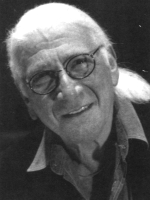JERRY GOLDSMITH

When I was 14 I saw Spellbound. I loved the music (Miklos Rosza). When I came out of the theatre I determined I was going to marry Ingrid Bergman and write music for films. I didn’t manage the first but I did manage the second.” Since that young age Jerrald K. (Jerry) Goldsmith has composed for going on 200 films. He has garnered no less than 17 Academy and 7 Golden Globe nominations plus an Oscar. When not scoring Jerry is seen in various parts of the world conducting symphony concerts, composing for orchestras and recording and teaching at universities. Yes, and fans in England have a Goldsmith Film Society that puts out a newspaper to 25 countries.
To mention just a very few of Jerry’s scores—Alien, Boys from Brazil, Chinatown, Sand Pebbles, Seven Days in May, Star Trek. This year alone Jerry’s output includes Deep Rising, Air Force One, The Edge and L.A. Confidential with Lost in Space and U.S. Marshall upcoming.
At the rear of Jerry’s Beverly Hills home, behind the swimming pool, is an attractive two–storey building built for his work. Upstairs, amid a multi–track board, umpteen keyboards, computer gear etc. he told me of his early life.
“When I was just 12 or 13 I realised that I could never be a concert pianist. By the age of 14 I knew definitely that I wanted to write music for films. My parents were not musical but I got the best teachers. I studied harmony with Tedesco.
“I went to the University of California (USC) but got bored there after a year. I went to (L.A.) City College and worked as an assistant conductor, director of the choir and I wrote choral music.
“At 21 I got married, left school and got a job at CBS radio, in L.A. I was actually typing scripts. I had to make a living. In the evenings I was teaching piano, coaching singers and playing at ballet classes. Then, after a year (at CBS) I got to writing (composing music) for shows (radio). I was very lucky—inspired by sheer nerve.”
In 1955 dramatic television started. Jerry had the popular Climax. CBS put him under contract. He started composing for shows every week—“a few musicians with myself playing piano and organ.” It wasn’t until the late fifties that Jerry started in movies. He had never studied the technique of film scoring although he had taken a course with Miklos Rosza at USC.
“There’s no way of studying film scoring,” he averred. “I tell my students: ‘Learn to compose.’ You can learn (the technique) in a matter of weeks. The rest is experience.
There is no other way you can learn. There can be changes on the scoring stage—a few seconds earlier or a few seconds later. There’s no way you can teach that.”
Jerry’s initial influences were Franz Waxman and his USC teacher Rosza. Later came almost every musicians’ idol, Alex North. “Alex is the most important figure in film music,” Jerry declared. “When I first heard Streetcar Named Desire it all changed. Up to that point it had all been late 19th century and early 20th century European.
He (North) spoke with a truly American voice. He was the only one to truly integrate jazz and symphony. “When I started writing for films there were no shackles. I could experiment, do anything I wanted.” Jerry reminded me of the 12–tone score (Cobweb) of Leonard Rosenman in the fifties. He opined that the climate is more conservative, mainstream now. Speaking personally, he stated: “When you are in you late 20s or early 30s you have nowhere to go. You either go up or down. Later you get conservative—to protect what you have. The last way out score I did was Alien. Most of the films I do now are very mainstream, very conservative. But I still try to experiment.”
Jerry stated that electronics have enabled dilettantes to try practising the art of film music. “Synthesisers are a new toy. In my score for The Edge there are no electronics whatever.”
Jerry doesn’t object to synthesisers “if used judiciously with the orchestra, and not laid on with a trowel.” All the leading film composers have complained about the much shorter time they are given today compose a score. “It’s four to five weeks now. It used to be ten weeks. Now, too, there is more music. Now I have one hour of music where it used to be 30 to 40 minutes.” Jerry uses an orchestrator in a very limited way. He does a nine line sketch. Thus it’s really all there and an orchestrator really has almost a copyist’s job. “When I have time, of course, I do all my own orchestration,” he informed.
Famed movie composer Bernard Herrman once said to Jerry: “You sold out. You are using an orchestrator. There’s no such thing as an orchestration. You are a composer!” (Herrman wrote everything on the score).
What about the trend today to use music as sound effects in “Mickey Mouse” manner? Goldsmith explanation: “It’s because the director wants it. If this is it, I try to get more subtle—why am I opening the door?!” Goldsmith advice to up and coming movie composers?—“Education. Today there are some who can’t even read music. I had students in my class that had masters degrees in composition but they couldn’t write a 32 bar tune. So I found myself spending six months teaching them how to write a melody.
“I was fortunate to have a long training period. I will finish when I stop composing. There are no cast iron rules. What works in one film doesn’t work in another. You use your experience and intuition if you have the talent for it. I have done going on 200 pictures. I still learn something every time I put notes on paper.”
This article was first published in Crescendo & Jazz music, October 1997.
Copyright © 1997, Howard Lucraft. All Rights Reserved